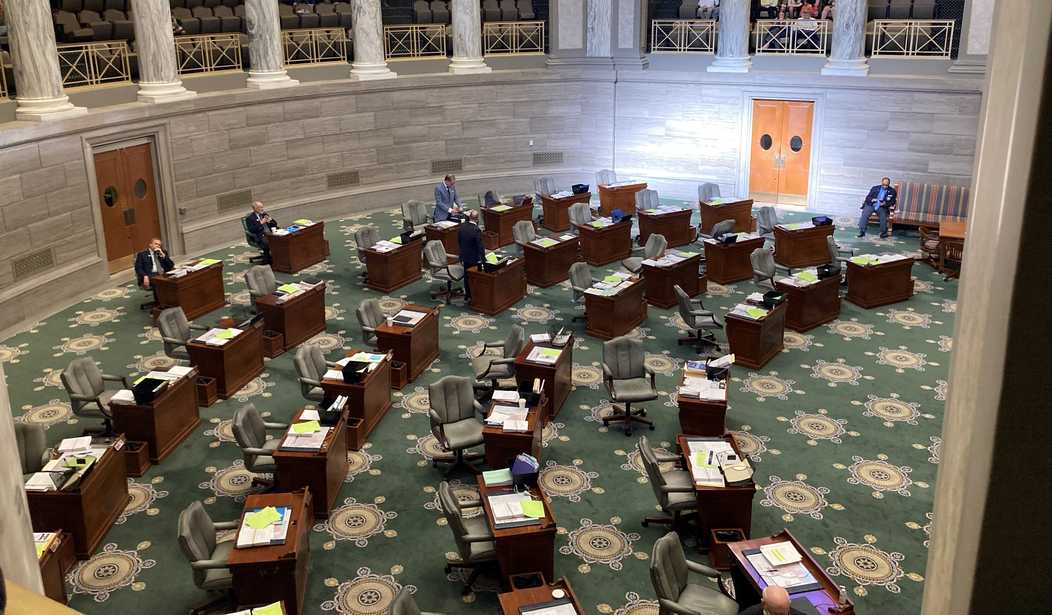It is probably a pretty safe bet that if you asked Americans what they hate most about politicians — and Washington D.C. in general — it is the fact that, once they get there, the people elected to represent them seem to forget why they are there and for whom. It becomes all about power, influence, and enriching themselves. How else did Joe Biden, the self-described "poorest member of Congress," become a multimillionaire? While there is plenty of speculation on how that happened, now, one candidate for Senate may just have a solution for at least trying to clean up politics, and he is taking a cue from former Speaker of the House Newt Gingrich.
My contract with Utah. To lead and support efforts to
— Mayor Trent Staggs (@MayorStaggs) November 7, 2023
-end insider trading in Congress
- stop lobbyists from funding campaigns
- enact term limits
-oppose omnibus bills
I encourage all other candidates to commit to the same. pic.twitter.com/JLim5N5l3T
Trent Staggs is currently the mayor of Riverton, Utah. He announced in May that he would be challenging Sen. Mitt Romney (R-UT) in 2024. But that changed when Romney announced in September that he would not seek reelection. Speaker of the Utah House Brad Wilson is also running for the seat. Romney has been seen as one of a handful of squishy Republicans, one who supported Black Lives Matter and voted twice to convict impeached former President Donald Trump. Staggs has come up with an interesting way to move Utah Republicans forward from the Romney era, and if it went national, it would literally change the status quo in Washington, D.C.
Staggs is asking his fellow Senate candidates to get behind something he has dubbed the "Contract With Utah." In a nod to Gingrich's 1994 "Contract With America," he has developed a seven-point initiative that his campaign describes as a way to “reduce corruption within the halls of Congress" and “restore fiscal order." The Contract With Utah would:
1. Ban the trading of individual stocks by members of Congress and their immediate family members.
2. Ban lobbyist donations to both candidates and members of Congress.
3. Ban members of Congress and other high-ranking government officials from lobbying or receiving any government contracts for at least ten years after leaving office or their government post.
4. Limit members of the Senate to two terms and House members to three terms.
5. In the event of a government shutdown, members of Congress would receive no pay and would be ineligible for back pay.
6. Return to a regular appropriations process and oppose all omnibus spending bills.
7. Pass a balanced budget amendment.
Staggs said in a statement:
“Right now, Washington is broken. Fixing it starts with getting special interests out of Congress. I’m making sure Utah voters know exactly where I stand, and I’m asking all others running for the Senate to do the same.”
Exclusive – Utah Mayor Trent Staggs Slams Romney for Blaming Trump for Own Indictment: ‘He Has No Backbone’https://t.co/E2KJxi0vWZ via @BreitbartNews
— Joshua Klein (@JoshuaKlein_) June 11, 2023
With Utah being a fairly solid red state, this should do well there. But could Trent Staggs, if elected, turn the "Contract With Utah" into the "Contract With America 2.0," possibly with other newly elected GOP Senators in 2024? It is a very interesting proposition indeed. It would certainly address the issue of members of Congress like then-Senator Joe Biden, who came to Washington as relatively middle-class and went on to amass wealth. And consider the case of former Speaker of the House Nancy Pelosi, whose husband Paul's lucrative stock trades made her one of the wealthiest members of Congress. Paul Pelosi's trading habits garnered more attention in June of 2022 when he purchased roughly $5 million in graphics card manufacturer Nvidia only weeks before the House considered a bill that would provide over $50 million in subsidies to the domestic semiconductor manufacturer.
A national contract would prevent "lifetime elections." There would be a good chance no one else would die in office, as was the recent case of the late Democratic California Sen. Dianne Feinstein. This would force those who make the laws to return home to live under those laws. Looming government shutdowns could become things of the past without massive pork-filled omnibus spending packages that, in the immortal words of former Speaker Pelosi, "We have to pass the bill so we can see what's in it."
The most important question: Who would vote for it, and who would not? Neither party is innocent on this one, and every House and Senate member would know that they were on the record as having voted for or against. For quite a few, that just may be political suicide.
If Republicans can hang on to the House and take the Senate and the White House next November, and the good people of Utah send Trent Staggs to Washington, he may just be encouraged to introduce this on a national level, and that sound you hear could be of the swamp draining just a little bit more.
Senate candidate Trent Staggs: "Hey MItch—why don't you pony up some of your own money for UKRAINE!" pic.twitter.com/TmL62CfS4F
— ULTRA MAGA PARTY 👑 (@MaxEvansUMP) November 1, 2023














Join the conversation as a VIP Member